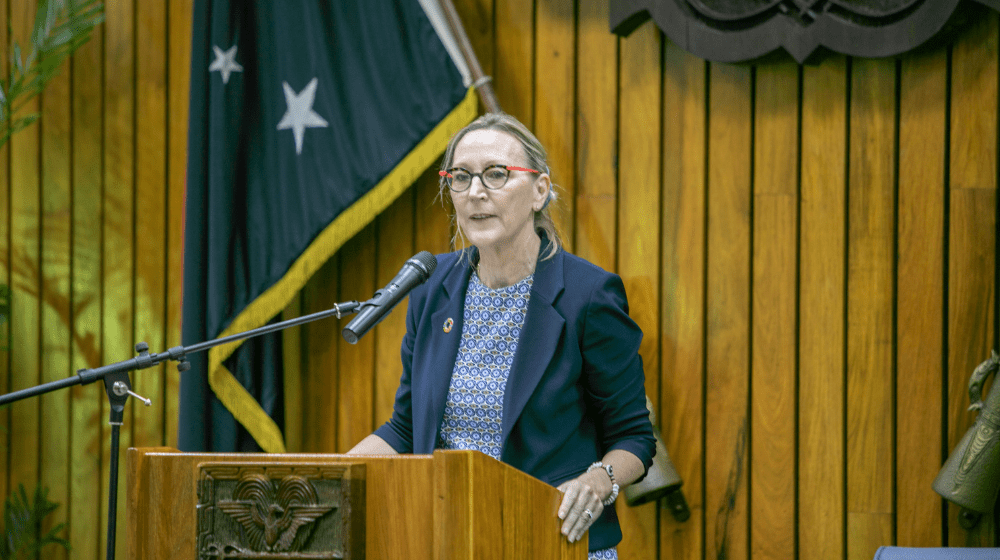Good morning and welcome to the Youth Parliament 2022.
I would like to acknowledge our guests:
- Mr Kala Aufa, Clerk of the National Parliament;
- Mr Joe Itaki, Director General of the National Youth Development Authority;
- His Excellency Jaques Fradin, Ambassador of the European Union to Papua New Guinea
- Mr Dirk Wagener, UNDP Resident Representative
Welcome to our 60+ youth representatives, joining us from around the country.
We often say that youth are the future of the country. But you are also the present. Young people, under 25, make up 60 percent of the population of Papua New Guinea. You are leaders - right now, in your communities, in your organizations, in your provinces. This Youth Parliament is an opportunity for each of you to think about leadership - about what type of leader you want to be and the qualities you want to see of the leaders in this house.
Think about who you are here to represent. What are the issues that matter to those people? How do they want to be represented?
A significant feature of the Youth Parliament is the debates. You will have to take a side and argue for it. There are rules here in how debates are run – the debates should be respectful and informed even on a Friday afternoon. One of the qualities of leadership that you can practice here is managing how you disagree - your composure and your capacity to respectfully debate issues. Some of these issues may be emotional. When it comes to being a leader, there is a difference between emotion and conviction. You must have conviction and purpose. You should be able to understand your emotions and learn how to manage them especially in stressful conversations.
That is why self-awareness is important. One of the main responsibilities of Government is to ensure peace and safety of all its people. Emotions can cloud judgment and be a destabilizing force. Be careful what you say. Do not allow your personal feelings to jeopardize peace, social or financial stability. But do learn how to put forward your views, argue for your convictions. As long as it is for the great good of all PNG.
Think about why you are here. Consider what world you want to create and take the time to look at the barriers and the opportunities, that are in front of you. New legislation is not always the solution. Maybe the laws and policies are already there and your opportunity for change is at the provincial level. Maybe there is another organization working in the same space that you can work alongside to accelerate change, rather than start afresh on your own. Success and survival in the 21st century is about learning to cooperate and collaborate.
The planet is facing unprecedented challenges due to climate change. You must be smarter than the generation before you. You must commit to learning and reading so that you can apply that knowledge for the benefit of your people. What books are you reading now? They cannot just be fiction. You must be committed to rejecting fake news – use facts to support your convictions. Fairy tales have their place but not in the house of Parliament.
Respect your past culture and traditions. Learn to respect the culture and traditions of other tribes. Be curious but not judgmental. Remember your Constitution. At the back of it there are schedules – they guide how the Constitution should be interpreted. While customary law can be used, in the instance where it goes against the principles of human rights, human rights and the modern legal system prevails. You cannot support SARV for example because it violates PNGs own laws.
You may not know this, but PNG’s Constitution was the first to be developed through a participatory process. That means that people from all over the country came together to input into your constitution. It is the people’s Constitution and it needs to be understood, protected and respected. It is your responsibility to understand it – knowledge is a privilege and takes commitment. It does not fall from the sky. You need to want it and work for it.
I encourage you all to make the most of this opportunity. Speak together, look for the common ground and the opportunities to strengthen the work you are doing.
Remember that while this can sometimes seem like a room of divisions, these processes are in service of reaching an agreement. The Preamble to the Constitution states that we ‘seek consensus as a means to solving our common problems’. Keep that in mind over these next days as we look at some key issues facing Papua New Guinea. Solutions will not come about by trying to yell the loudest. They will be achieved by the leaders who bring people with them in their vision for change.
Thank you and enjoy these next few days.


